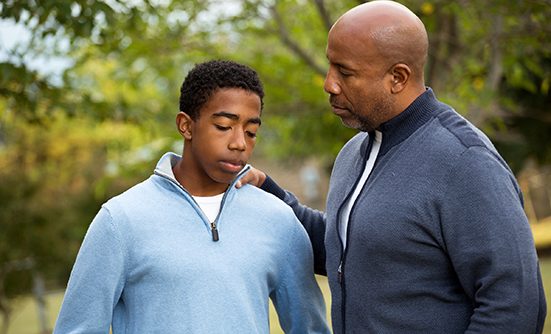Parenting can be hard enough when things are “normal.” Throw in a cancer diagnosis, and your world can spin out of control.
Shara Sosa, MSW, LCSW, Oncology Counselor at Life with Cancer, in Fairfax, VA, had some advice about talking to children and adolescents about their parent’s cancer at last year’s CancerCon meeting.
She herself is a cancer survivor and was diagnosed after college with a rare synovial sarcoma. Not finding a support group for young adults with cancer, she started such a group, and she now uses her experience to help families cope with cancer. Ms. Sosa shared her insights with CONQUER.
The main point is that children need honest information about the diagnosis, and even about the possibility of death. This means that parents, caregivers, and providers should address all questions, thoughts, and emotions with clear language. Although the natural instinct is to keep frightening information from children, gentle but truthful communication helps the most.
Parents have 2 main concerns—that their child is afraid the parent will die, and that the parent will die and leave the child behind. In truth, the parent and the child are worried about the same thing.
The way to face these fears is to meet them head-on, but not with a battering ram. It’s best, according to Ms. Sosa, to “go through the side door, and not the front door,” when possible.
Most important, address your child openly and in a developmentally appropriate way. No matter the child’s age, there are some common things to keep in mind.
“First, children want to know what is happening. I tell parents, ‘The quieter your voice is, the more those ears perk up. Don’t get on the phone and start whispering. They will believe the worst,’” Ms. Sosa advised. Conduct serious conversations away from children.
What I Tell the Child
Although they’re often afraid to voice their fears, children should be encouraged to open up, either to you or to a professional. “I tell children that whatever they are thinking, mommy or daddy has already thought it, too, so don’t be afraid to go talk to them,” she said.
Like all of us, children want to be informed, to feel loved, and to feel safe. To help children feel safe, reassure them that you have excellent doctors, that you are doing all you can to get well, and that they have a big support system.
Ms. Sosa also assures children that whatever their problem, a solution can be found. “Will it be your most favorite solution? Probably not. But, we can always find one of some kind,” she tells them.
Dealing with a Terminal Illness
It’s especially challenging when the cancer is terminal. Ms. Sosa suggests gentle honesty in this situation. “Most people in the child’s world are not telling them the truth. I sometimes have to be that person, and that’s when I have to ‘go through the front door.’”
Children can be told, “Mommy has the best doctors, but sometimes the cancer gets bigger than us. Sometimes the cancer wins.” This can segue into a necessary discussion about what will happen next.
Children of all ages should continue to spend time with their ill parent. Young children, for example, can have a “picnic in bed” if the parent is too sick to come to the table. They may be intimidated by tubes, oxygen, and so forth, but they need to know to keep the hugs and kisses coming; it’s good for the parent and good for the child.
Teenagers can be more difficult. They often cope by spending more time away from home. Especially since teenagers are prone to feelings of guilt when a parent dies, time spent with a dying parent is very important.
“I tell teenagers that it’s great they are maintaining normal activities, but isn’t there some time in your schedule that you can dedicate to being with your family?’ Then I will often add, ‘When you carve out that time, leave the screens (phones, iPads) behind,’” she said.
“I say that hopefully your dad will live to be 80, but if not, think of one thing you can do with him so you feel you were engaged and involved, and do it!”
Talking to Children About Your Diagnosis
Be open and honest; explain what is happening in terms the child can understand
Talk about how hospitals, doctors, and treatments are helping
Listen to your child with your eyes and ears; observe behavior
Give permission for the child’s emotions, and share yours
Try to keep life as “normal” as possible; routines are comforting
Let teachers know what’s happening, and look for support in all corners















